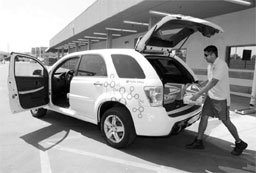Chapter 4 Our Operations
Alternative Fuel Vehicle Program
The Postal Service operates a large alternative fuel-capable fleet, including more than 37,000 E-85 flex-fuel vehicles that can operate on gasoline, E-85, or any mixture of the two fuels. In 2008, an additional 1,352 E-85 vehicles were acquired. In addition, the Postal Service has embarked on a variety of initiatives to further lessen its dependence on fossil fuels. Specifically, an agreement was signed with General Motors to test their 4th generation hydrogen fuel cell Chevrolet Equinox with funding support from the U.S. Department of Energy. A hydrogen fuel cell Equinox has been used to deliver mail in Irvine, CA, since July 2008 and another Equinox will be deployed in the Washington, DC, area in early 2009.
The Postal Service is currently working with other enterprises on the testing and evaluation of electric and hybrid vehicle technologies that could be well suited to the postal fleet. Moreover, tests continue on medium-duty hybrid electric step vans. A delivery diesel vehicle was converted by a supplier that shows very promising fuel-economy improvement. Also in 2008, the Postal Service purchased several T-3 three-wheeled electric delivery vehicles that are being used to deliver mail in areas of Florida, California, Texas, and Arizona.

The Postal Service is testing the new Chevrolet Equinox fuel cell electric vehicle for mail delivery. With the world's largest civilian transportation fleet, the Postal Service leads the federal gevernment in the number of alternate fuel vehicles it operates.
WATER MANAGEMENT
The Water Management program was formed to meet environmental standards for pollutant discharges, storm water runoff, and safe drinking water. It also supports efforts to minimize water usage. An overall water management strategy has been developed to ensure compliance with the requirements of the Clean Water and Safe Drinking Water Acts. In addition, Vehicle Maintenance Facilities will continue its policy of “zero pollutants” in the discharge from washing vehicles. Contracts include provisions to capture runoff and use environmentally-preferable products.
With ever increasing pressures for clean drinking water, the Postal Service is working to minimize water consumption. All new construction and major renovations will utilize low-flow, high efficiency plumbing fixtures. In addition, practical water saving opportunities identified during audits will be evaluated for implementation. In order to better understand water use patterns, the organization is now capturing water consumption data for 50 of the largest buildings. This information will help identify water saving opportunities at other buildings.
Asbestos Management
The National Asbestos Management Program is being revitalized by continually updating policies and procedures. Over 31,000 asbestos surveys have been located, scanned, and added to an Environmental Toolkit used by different departments. Approximately 2,600 more surveys are to be entered into the system.